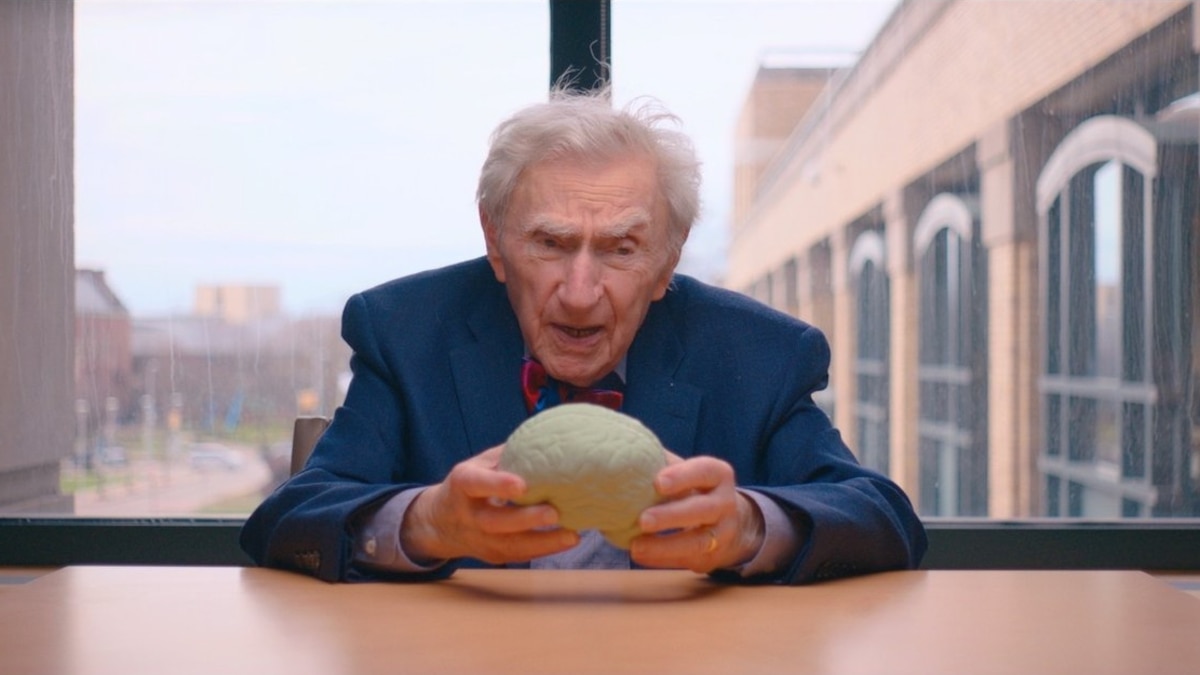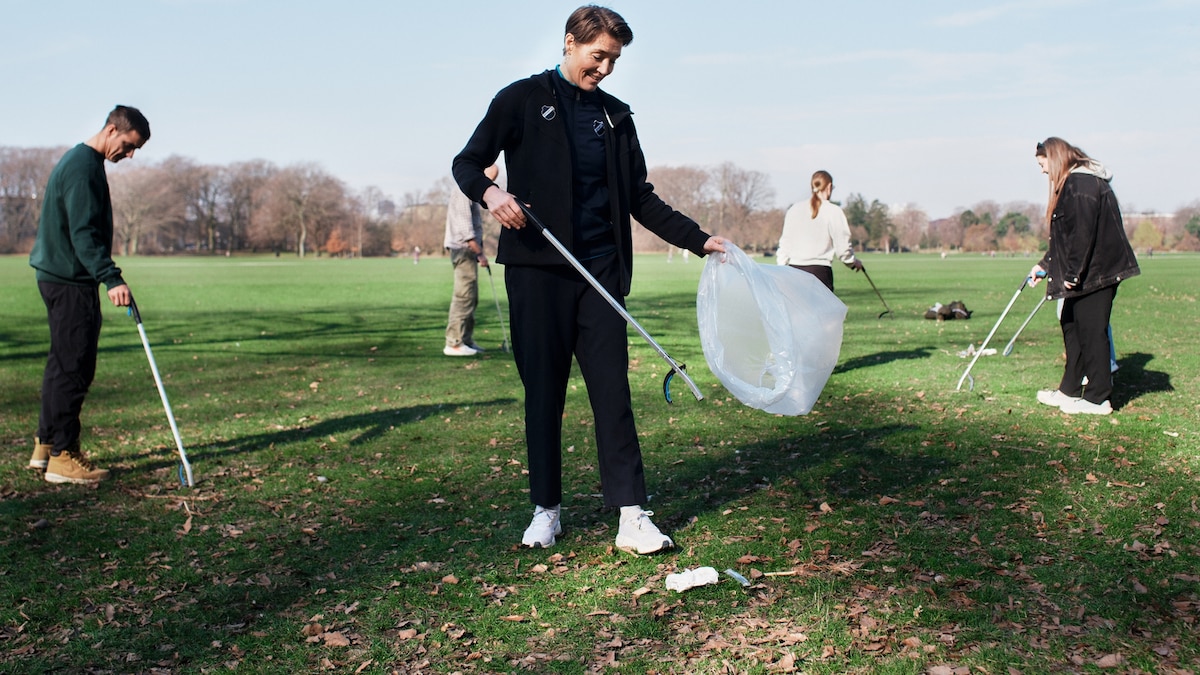Now Reading: At 102, he’s the world’s oldest practicing doctor. These are his longevity tips.
-
01
At 102, he’s the world’s oldest practicing doctor. These are his longevity tips.
At 102, he’s the world’s oldest practicing doctor. These are his longevity tips.

At 102 years old, Howard Tucker is the world’s oldest practicing doctor—and he’s eagerly looking for new work since the hospital where he taught medical residents closed in 2022. “Right now, I’m out of a job,” Tucker says.
While he’s no longer seeing patients, Tucker’s resume speaks for itself. He received his medical doctorate in 1947 and completed his neurology residency in 1953. He served in the U.S. Navy during World War II and was the chief neurologist for the Atlantic Fleet during the Korean War. In 1989, at a spry 67, Tucker pursued a law degree and passed the Ohio State Bar exam while continuing to work as a neurologist. He helped treat patients in the earliest days of the COVID pandemic and, today, he occasionally teaches medical and law students at Case Western Reserve University in Cleveland, Ohio. He still consults as a specialist for medical legal cases too.
(7 simple science-backed rules for living longer.)
More recently, he’s also become a TikTok star, with 101,000 followers and counting. Tucker’s grandson, Austin, created the account with his friend Taylor Taglianetti. Together, they produced the documentary What’s Next? to showcase Tucker’s extraordinary accomplishments and zest for life.
Ahead of his 103rd birthday in July, National Geographic asked Tucker for his secret sauce to longevity. The centenarian staunchly credits a continuous pursuit of knowledge and connection—and the occasional martini. Read on for his tips for better health and the habits he believes everyone should avoid.

The centenarian neurologist credits social connection and continuous pursuit of knowledge as key to his longevity. Above, Tucker is seen at Progressive Field in Cleveland before throwing out the first pitch at a baseball game on his 100th birthday.
Image Courtesy What’s Next? Documentary
NATIONAL GEOGRAPHIC: You’ve said that retirement is the “enemy” of longevity. What brought you to this realization, and why do you feel strongly about it?
HOWARD TUCKER: These are not just my whims. It’s been documented that for each additional year of working, there’s a lower risk of dementia. It’s important to continue with decision-making, with social interaction. This slows down cognitive decline. It goes back to the old theory of ‘use it or lose it.’ If you don’t use your brain, you’re going to lose it.

How smelling roses could help you make stronger memories
A scent, a touch, or a sip can be just what you need to lock an important moment into your mind forever.
What advice would you give to people whose work is harming their health?
I would hope those people could acquire a new profession. You know, I had a patient who found it necessary to drive around the city block several times before she could go to work as a secretary, and she had a stroke at 42 because of the stress that built up. So the advice to her, of course, would have been to find another boss.
What are three healthy habits that you keep up with and recommend?
Stay physically and mentally active, do not smoke cigarettes whatsoever, and don’t harbor hatred.
When you hate, you’re physically abusing yourself. Your pulse and blood pressure go up. It’s the same stress that you’d get with any anxiety. Look, hate is innate. When we hate someone, we increase our own stature, emotionally, and it just doesn’t work that way. There’s no reality to it, except the unhealthy physiological responses.
Do you think smoking is as big a problem for younger people today compared to 30 or 40 years ago?
Yes, it is. While I was in med school, Alton Ochsner, a surgeon from the Ochsner Clinic (now Ochsner Health), came to talk to my class. He showed that in the generation before mine, very few women smoked. The few who did smoked in the house, never in the streets or in public. At that point, it was conceived that lung cancer was a disease of men, as breast cancer is a disease of women. But he showed compelling evidence that increasing lung cancer rates paralleled the incidence of smoking in ladies. That resolved it in my book. It’s dangerous.
Now, not all doctors believed that. Doctors used to say to patients, “Take up smoking, it’ll curb your appetite and quiet your nerves.” My medical students and residents are shocked when I tell them that doctors would sit on the bed in the hospital smoking a cigarette, and the patient would be in the bed smoking a cigarette.
I think the same pattern could happen with marijuana. Right now, the government blesses it like it did tobacco. There is increasing evidence that after inhaling marijuana, coordination goes down and intellect is modified. You see premature heart activity—heart attacks, strokes—and this is kind of being brushed aside.
(Marijuana doubles your risk of cardiovascular death, worrying new study shows.)
Do you feel the same way about drinking alcohol?
To me, moderation seems to be correct. When people would ask me about longevity, as a real punkster, I would say: wine, women, and song. There’s a lot to be said for that. (Although, now there have been a few negative reports of wine, even in moderation.)
Do you believe diet influences longevity, and what does yours look like?
While I don’t believe one diet fits all, it’s clear that incorporating more whole, healthy foods as opposed to processed, fried, or sugary treats can help prevent medical issues in the long run. I’ve seen countless food trends come and go throughout my lifetime. There will always be a new study highlighting the benefits or risks of eating just about anything.
You May Also Like
I typically start my mornings with fresh fruit and toast alongside my lovely wife. I’m not usually hungry for lunch, and when I was actively seeing patients, I often skipped it. For dinner, I’ll have chicken, fish, or the occasional steak, paired with vegetables or a salad. Add in the occasional martini, and that’s a perfect meal in my book. I will admit I’ve been indulging in ice cream and doughnuts a bit more in my 100s than I ever did when I was younger.
Of course, we know exercise is important too. How has your exercise routine changed?
Let me put it this way: I do enjoy the treadmill at a much lower pace than I had been doing, but at the same time, I must have something interesting on the television set to survive that ordeal.
As you grow older, you don’t exercise as vigorously, but making time for exercise is important. It strengthens your heart and stimulates your brain. Walking is good, particularly for older people, as is jogging. Try to keep up with walking because eventually there are limitations—your arteries become hardened, you can’t walk as far or as fast, or your balance is off. But there are other opportunities: Stationary bikes, stair climbers, ellipticals, all of those keep you stimulated.
(Why outdoor adventure is important for women as they age.)
Do you have a hobby that keeps your brain sharp and life fun?
I still snowshoe. My balance is off, so it’s becoming more dangerous, but I go with my kids. While they ski downhill, I live vicariously through that.
You’ve also been married for nearly 68 years. How has your connection with your wife shaped your health?
Well, she keeps me sober. She keeps me modest. We just enjoy each other’s company.
Do you believe that friendships are just as important?
Friendships can be very powerful and should be. My father had friends in their 30s when he was in his 90s, and that kept him alive. The same thing is happening to me. Although I don’t have any friends in their 30s and all my close childhood friends are gone, I certainly have friends 25 years younger than I am, and they stimulate me to think better.
Has the way people speak to you changed as you’ve grown older?
Yes, it has, and it’s not comfortable. People will talk about me to my kids in my presence and not ask me questions directly. They kind of demote you, figuring that you have to be a doddering old soul. It’s not necessarily realistic. It’s offensive too.
Yet you seem hopeful and happy when you speak about life. What is your secret to staying optimistic?
I ignore my age. Age is so relative. When I was 40 years old, I was talking to a group of medical students and residents, and I said I never worry about a premature death. One of the people in the group said, “Dr. Tucker, you’re already past age.” I was 40! I think not being fearful of every moment of life is terribly important.
What’s the most exciting medical discovery or advancement that’s changed your work in neurology?
Imaging, specifically CT and MRI scans, took us from the medical Middle Ages into the 20th century. It has greatly advanced our ability to diagnose and treat countless conditions without resorting to outdated and invasive procedures.
That said, I still caution my medical students and residents to never rely on imaging alone. I emphasize the importance of taking a thorough patient history. Get to know your patient. Understand the full clinical picture. Only then should you use imaging to confirm or challenge what you already suspect. Despite all our technological progress, the human side of medicine remains just as vital as ever.
What’s the biggest myth you hear about longevity?
People often suggest that eating X or strictly following Y routine will help you live longer. I don’t believe in extremes or fads. In fact, I think going to extremes can be more harmful than helpful. Certainly, genetics and luck play an enormous role. Beyond that, I believe the key is everything in moderation.
They once asked the Irish playwright George Bernard Shaw what he owed his longevity to. He claimed the secret was a vegetarian diet, no alcohol, and no caffeine. Then they asked Sir Winston Churchill what he owed his longevity to: Sir Winston enjoyed Armenian brandy, meat at every meal, and smoking cigars.
I like to joke that I’m smarter than both of them. I don’t see the need or benefit in following fads, trends, or overindulging, but I do believe in enjoying life. Just no cigarettes!
This interview has been lightly edited for length and clarity.























